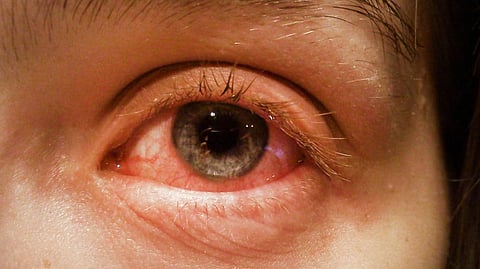

GUNTUR: Amid rising conjunctivitis or ‘pink eye’ cases in the district, authorities are on their toes to control the situation. The doctors are suggesting people prevent buying eye drops from medical shops, as over-the-counter (OTC) medications contain high-dose of steroids which pose long-term health effects.
As no specific records are maintained on the number of conjunctivitis cases, unlike seasonal fevers, the exact number of cases is not known, however, only a few per cent of the infected persons are seeking help from the hospitals, opined Guntur GGH superintendent Dr Kiran Kumar.
“We prescribe antibiotics and steroids and their doses based on the severity and medical history of the patients. The indiscriminate use of antibiotics and steroids may interfere with the delicate development of eyes and might lead to various complications including allergies, corneal opacity, and severe cases may even require surgical intervention,” he added.
While conjunctivitis cases are seen in all age groups, doctors said that school-going children are more vulnerable as infection can easily spread in classes or playgrounds. According to ICMR, New Delhi, this eye infection is caused by adenovirus, a common virus responsible for conjunctivitis. It is an inflammation of the conjunctiva, the thin clear tissue that lines the inner surface of the eyelid and covers the white part of the eye and can be caused by the virus.
Symptoms typically include redness of the eyes, irritation and blurred vision, sensitivity to light, and crusty eyelids. The contagious disease can spread by coming in contact with the discharge from the eyes, nose or throat of an infected person through touch, coughing or sneezing, or contact with contaminated fingers or objects.
“Social distancing, hand hygiene, and avoiding crowds is essential to curb the spread of the eye infection,” said Guntur DMHO Dr Sravan. The infection gets resolved within a week to 10 days. However, it is important to take proper precautions and adhere diligently to the prescribed treatment.
So the school management are conducting special awareness programmes to educate students on the symptoms of the eye infection and measures to follow if infected. They are also suggesting that parents not to send infected children to school till full recovery.